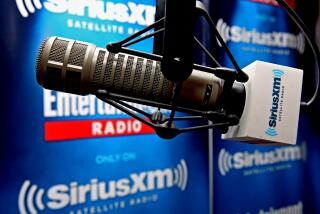Napster Relaunch May Be Far Off
- Share via
Buying the Pressplay online music service was the easy part. Now Silicon Valley software firm Roxio Inc. faces the difficult task of making it profitable.
By the time Roxio combines Pressplay with the Napster technology and brand name it also owns, the Santa Clara, Calif.-based company can expect to face more intense competition from other authorized sources of music on the Internet.
Roxio Chief Executive Chris Gorog said it could take as long as 10 months to revamp the 1 1/2-year-old service, which offers more than 300,000 digital songs by subscription. That’s a virtual eternity in the fast-changing world of online music.
“There’s going to be a lot of competition in this sector,” Gorog acknowledged Monday after completing a multimillion-dollar deal to buy Pressplay from joint venture partners Sony Corp. and Vivendi Universal, owners of two of the world’s biggest music companies.
Roxio paid $12.5 million in cash and about $32 million in newly issued stock. Those 3.9 million shares give Sony and Vivendi a stake of more than 8% in Roxio. The software company also pledged to pay Sony and Vivendi up to $6.25 million apiece from future sales of the music service.
News of the deal boosted Roxio’s shares $1.19, or 17%, to $8.09 in Nasdaq trading Monday.
Roxio plans to spend about $20 million on its Pressplay overhaul, including a new user interface designed with the help of Napster founder Shawn Fanning, Gorog said.
But by the time it’s done early next year, Apple Computer Inc. of Cupertino, Calif., is likely to have expanded its popular iTunes Music Store to consumers using PCs powered by Microsoft Corp.’s dominant Windows operating system. And MusicMatch Inc. of San Diego expects to integrate downloadable songs into its personalized online radio stations in the fall.
“There are going to be a whole load of people selling downloads by the end of year,” said Lawrence Kenswil, president of Universal Music Group’s ELabs in Santa Monica.
But Roxio’s service will have an edge, music industry executives said, because it will bear the Napster name. The appeal of the brand made famous by music pirates is one of the reasons Universal and Sony decided to sell Pressplay for less than the approximately $60 million they had invested in it, executives said.
“These were the guys who were the symbol of the bad guys,” said Andrew Lack, chief executive of Sony Music Entertainment in New York.
Pressplay’s biggest challenge has been enticing consumers to try the service, a problem the Napster brand could solve immediately, Kenswil said.
But analysts cautioned that the technology behind the service would be at least as important as its name in attracting new users and persuading them to stay and pay.
“We believe that a legitimate version of Napster can be quite successful,” Raymond James analyst Phil Leigh said. “However, it will be necessary that it be more consumer-friendly than the present version of Pressplay.”
The system’s makeup has yet to be determined, but Gorog said it would include greater flexibility in creating compact discs and moving songs from personal computers to other devices.
At least at first, it would not include the peer-to-peer architecture pioneered by Napster before it was shut down for helping its users violate music copyrights.
Even if the service fails, Lack said, the episode will have cost Sony only a few million dollars, which isn’t much money to spend exploring how to sell music online.
In the meantime, he said, the labels’ attitude has shifted from making sure there is one viable service to sanctioning as many legitimate business models as possible.







